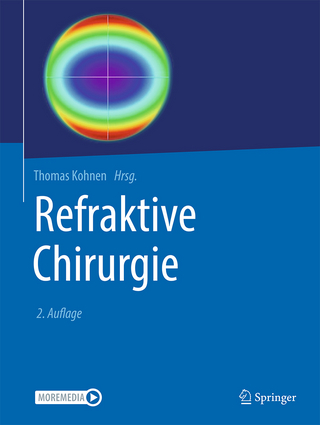
2022-2023 Basic and Clinical Science Course, Section 03: Clinical Optics and Vision Rehabilitation
Seiten
2022
American Academy of Ophthalmology (Verlag)
978-1-68104-543-6 (ISBN)
American Academy of Ophthalmology (Verlag)
978-1-68104-543-6 (ISBN)
- Titel erscheint in neuer Auflage
- Artikel merken
Major revision.
The Academy's Basic and Clinical Science Course™ is ophthalmology’s definitive source of clinical information. Practicing ophthalmologists and residents worldwide use the BCSC® to ensure the highest-quality patient care. Each of the 13 volumes includes up-to-date clinical knowledge, concise information, tables, self-assessment questions with answers, photos and illustrations and opportunities for earning AMA PRA Category 1 Credit™.
Beginning with the 2013–2014 edition, the Academy and the European Board of Ophthalmology (EBO) have partnered to make the BCSC the standard text for all European ophthalmology training programs. The EBO now recommends the BCSC as the primary educational resource for European trainees and ophthalmologists studying for the annual EBO Diploma Exam.
Section 3 has changed from Clinical Optics to Clinical Optics and Vision Rehabilitation. This section provides a comprehensive overview of clinical optics, including current applications of optical phenomena such as lasers, spectacles, IOLs and refractive surgery. An update to the vision rehabilitation chapter addresses the wide range of vision rehabilitation interventions: smartphone accessibility features and apps, electronic magnification devices, audio devices, and a variety of optical devices.
This major revision begins with an expanded Quick-Start Guide, which now includes an extensive discussion on retinoscopy. The Quick-Start Guide includes seven Try It Yourself! exercises on Hand Neutralization of Spherical and Cylindrical Lenses, Making a Practice Eye, and Detection of Astigmatism.
Increase your understanding of human eye optics; basic concepts of geometric optics; ophthalmic instruments and contact lenses with nine clinical videos. A new animation demonstrates a circularly polarized electromagnetic wave. Plus, a new dynamic illustration allows modification of "live" drawings to experience the effects of changes in the positions of source objects and focal points.
Upon completion of Section 3, readers should be able to:Outline the principles of light propagation and image formation and work through some of the fundamental equations that describe or measure such properties as refraction, reflection, magnification and vergence.
Define the various types of visual perception and function, including visual acuity, brightness sensitivity, colour perception and contrast sensitivity.
Explain the optical principles underlying various modalities of refractive correction: spectacles, contact lenses, intraocular lenses and refractive surgery.
The Academy's Basic and Clinical Science Course™ is ophthalmology’s definitive source of clinical information. Practicing ophthalmologists and residents worldwide use the BCSC® to ensure the highest-quality patient care. Each of the 13 volumes includes up-to-date clinical knowledge, concise information, tables, self-assessment questions with answers, photos and illustrations and opportunities for earning AMA PRA Category 1 Credit™.
Beginning with the 2013–2014 edition, the Academy and the European Board of Ophthalmology (EBO) have partnered to make the BCSC the standard text for all European ophthalmology training programs. The EBO now recommends the BCSC as the primary educational resource for European trainees and ophthalmologists studying for the annual EBO Diploma Exam.
Section 3 has changed from Clinical Optics to Clinical Optics and Vision Rehabilitation. This section provides a comprehensive overview of clinical optics, including current applications of optical phenomena such as lasers, spectacles, IOLs and refractive surgery. An update to the vision rehabilitation chapter addresses the wide range of vision rehabilitation interventions: smartphone accessibility features and apps, electronic magnification devices, audio devices, and a variety of optical devices.
This major revision begins with an expanded Quick-Start Guide, which now includes an extensive discussion on retinoscopy. The Quick-Start Guide includes seven Try It Yourself! exercises on Hand Neutralization of Spherical and Cylindrical Lenses, Making a Practice Eye, and Detection of Astigmatism.
Increase your understanding of human eye optics; basic concepts of geometric optics; ophthalmic instruments and contact lenses with nine clinical videos. A new animation demonstrates a circularly polarized electromagnetic wave. Plus, a new dynamic illustration allows modification of "live" drawings to experience the effects of changes in the positions of source objects and focal points.
Upon completion of Section 3, readers should be able to:Outline the principles of light propagation and image formation and work through some of the fundamental equations that describe or measure such properties as refraction, reflection, magnification and vergence.
Define the various types of visual perception and function, including visual acuity, brightness sensitivity, colour perception and contrast sensitivity.
Explain the optical principles underlying various modalities of refractive correction: spectacles, contact lenses, intraocular lenses and refractive surgery.
| Erscheinungsdatum | 17.08.2022 |
|---|---|
| Verlagsort | San Francisco |
| Sprache | englisch |
| Gewicht | 687 g |
| Themenwelt | Medizin / Pharmazie ► Medizinische Fachgebiete ► Augenheilkunde |
| ISBN-10 | 1-68104-543-5 / 1681045435 |
| ISBN-13 | 978-1-68104-543-6 / 9781681045436 |
| Zustand | Neuware |
| Haben Sie eine Frage zum Produkt? |
Mehr entdecken
aus dem Bereich
aus dem Bereich
Ein systematischer Ansatz
Buch | Hardcover (2022)
Urban & Fischer in Elsevier (Verlag)
CHF 369,95


